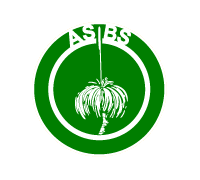
President's Report
ASBS Newsletter 94, March 1998
Constitutional Changes
Convention not needed! Donations to the Hansjorg Eichler Research Fund to be tax-deductable! Honorary Life Membership for worthy members! You can make it happen. John Clarkson explained the necessary constitutional changes at the general meeting in Adelaide and in the last newsletter. Please repay John's time, effort and enthusiasm by ticking "agree" six times on the voting form inside this newsletter. If you have any questions at all please contact John or myself. It's so easy to vote, and so satisfying.
Systematics Funding
Following the Adelaide meetings, Andy Austin (Society for Australian Systematic Biologists), Jack Simpson (Australasian Mycological Society) and I sent a letter to Senator Hill expressing our concern over the thrust of his speech read by Chris Gallus at the Adelaide conference. In his reply to our letter, Senator Hill announced the funding increase to the ABRS of $1.2 million. As I noted in an email sent to Chapter Conveners at the time (and in my submission to the ABRS), this is a one-off restitution which must be sustained and further increased.
FASTS happy to help out! could well be the next headline. Snow Barlow, our "cluster" representative, and Toss Gascoigne, Executive Director of the Federation of Australian Scientific and Technological Societies, offered immediate and helpful assistance in our quest to meet Senator Hill over the funding crisis for systematics research. As it happened, the timely injection of funds followed by a review of the ABRS intervened. I have now (mid-February) written again to Senator Hill, inquiring about the outcome of the ABRS review and offering (on behalf of the three society presidents) to discuss the issue in person. FASTS are at the ready to help us prepare a case and to arrange a meeting if necessary.
ABRS
In November, following a hurried emailout to conveners and councillors, I prepared a submission for an evaluation of the ABRS and the Biodiversity Program in Environment Australia. Thanks to those who proffered ideas and opinions. The final document attempted to explain the predominating views of the Society while outlining alternative perspectives (e.g. there was some difference in opinion over the relative importance of floristics versus phylogeny/monography in systematics funding). A meeting with Ray Walker, one of the consultants preparing the program evaluation, allowed me to further elaborate on some key points (i.e. the inadequacy of current funding levels, the lack of training and employment for recent graduates, the looming problem of the cryptogams, and the critical role of systematics in conservation management).
In general I support the current objectives and mechanisms of the ABRS but recommended an increase in funding for the annual grants budget to somewhere between $6.5m and $11-.5m. At the minimum level, $3.5m should be available through the participatory program for Flora and Fauna writing, $1m for studies of taxon relationships and evolution, $1m for multimedia products and $lm for a system and post-graduate scholarships and post-doctoral fellowships. I believe this is the minimum budget required to deliver high quality identification products, to maintain Australian expertise and to contribute to conservation management on a world scale. Of course such figures will always be contentious but I felt they reflected a realistic need and a responsible request.
More FASTS
In February, FASTS launched the third edition of their Policy Document, entitled "A Science Policy for Australia in the 21st Century". The key issues identified are:
These major themes are fleshed out into a series of statements. There is little specifically policy statements or biodiversity research but most of the actions apply equally to all scientific endeavour. Robyn Barker and I have copies of the Policy Document if you want a closer look.
Tim Entwisle